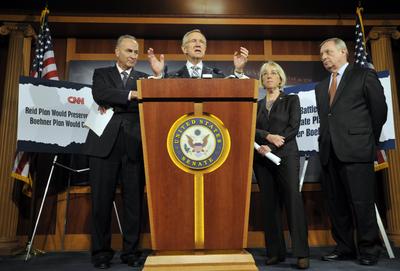The concern is straightforward: if American lenders in Asia, especially China, cannot trust the US on its word to abide by a financial contract then they will be less willing to trust the US on defence, trade or other issues of strategic interest. For them, this ongoing debate is not about fiscal stability but is just another sign that America’s leadership is short-sighted, untrustworthy and declining.
In the view of its Asia neighbours, this abdication of responsibility by the US to honour its commitments continues a trend of ineffective government decisions, exemplified by the missions in Afghanistan and Iraq — where, after nearly a decade, a decisive victory has not been achieved — and the bumbled Hurricane Katrina disaster response. The US government has appeared as feeble at best and anemic at worse, while China’s government has achieved nearly double digit growth and successfully planned and met its five year goals.
Add to this the 2008 Financial Crisis, labelled in many circles as the ‘Lehman Shock’ or ‘Lehman Crisis’. In affixing an American firm’s name to the financial meltdown, the perception of blame clearly resides on US shores. This, in turn, undermines economic liberalisation efforts and bolsters China’s case for a more controlled financial model. In their mind, and in the minds of other leaders, these events all contribute to a picture of an ineffective and now unreliable nation that has seen its better days.
In China, SINA blogs and nightly news programs are abuzz with discussion — not only doubting the intent and ability of the US to repay its debt but questioning Beijing’s decision to continue to invest in US treasuries. There are growing cries among the Chinese to move PRC holdings out of the US and invest in Southeast Asian countries — where relations are expanding — or in other regions perceived as more reliable instead.
This comes at precisely the wrong time. US Joint Chiefs of Staff, Admiral Michael Mullen stated this week that the US needs ‘to make the relationship better, by seeking strategic trust’ with China. Adding, ‘A good bit of misunderstanding between the two militaries can be cleared up by reaching out to each other’. He may be right. But when China believes the US government has such little regard for the more than US$1 trillion it owes them, China will trust America less on other matters, including military, where there is already skepticism, such as territorial disputes in the South China Sea. Earlier this month, Chinese army chief General Chen Bingde accused the US of ‘sending the opposite signal to the world’ in conducting joint naval exercises with other ASEAN nations after assuring China it wouldn’t intervene.
But to prevent a geopolitical disaster in addition to a predicted economic calamity, the US must raise the debt ceiling and ensure that the paying back of creditors is not held hostage to annual political machinations about America’s fiscal future. This must not be a monthly or annual sideshow. Congress should also delink the issues of paying back creditors to deciding which government programs it can afford — such discussions should be done during the annual appropriations process.
Undoubtedly, US fiscal policy should receive vigorous examination and debate. Such discussion is the hallmark of a democracy. But US leaders should realise that debating its intent to honour commitments not only makes countries weary of loaning the US money it also undermines US strategic interests.
David S Abraham is a Hitachi International Affairs Fellow at the Council on Foreign Relations and previously worked at the White House Office of Management and Budget.
Meredith Ludlow has worked for Pacific Epoch, a China research firm, and the US Department of Commerce in Shanghai.

